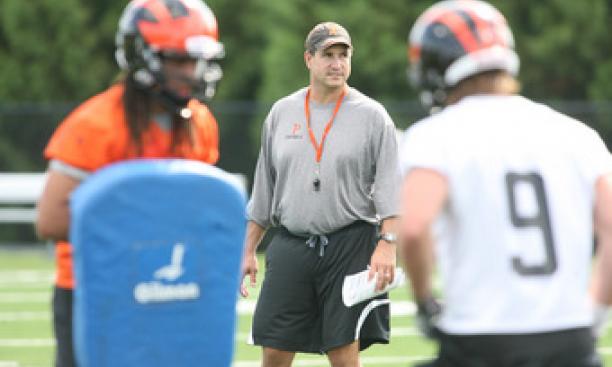
The Ivy League presidents have approved new football practice rules aimed at curbing concussions, the league announced July 20. Under the guidelines, teams will be limited to no more than two full-contact practices per week, significantly lower than the NCAA maximum of five. In spring practice, Ivy teams will be limited to seven full-contact practices, a one-session reduction from the previous league limit of eight.

Princeton head coach Bob Surace '90, center, said that two full-contact practices per week allow coaches to teach technique while limiting repetitive hits. (Beverly Schaefer)
Princeton head coach Bob Surace ’90 told PAW that the changes are “a step in the right direction” because they give coaches enough time to practice tackling and teach technique. The limit will not significantly change Princeton’s practice schedule, he added: Last season, the Tigers regularly held two full-contact sessions per week.
An ad hoc committee of university presidents, head football coaches, administrators, consultants, physicians, and trainers evaluated available research on head injuries and drafted the new rules, which take effect this fall. Dartmouth president Jim Yong Kim and Cornell president David J. Skorton, both medical doctors, served as co-chairmen. The committee’s report is available online.
The committee reviewed existing NCAA rules governing hits in games and did not recommend any changes. The rules “already provide a deterrent,” the committee wrote, and “very few plays in Ivy League games … resulted in penalties for significant hits to the head.” In the more than 13,000 plays from Ivy games in 2009 and 2010, 17 involved penalties for helmet hits, blows to the head, or hits to a defenseless player.
“We’re playing such a good brand of football, and such a physical brand,” Surace said. “For us to have such a low number of targeted hits – to me that’s an important thing.”
Dr. Margot Putukian, Princeton’s director of athletic medicine, represented the University on the committee. She led the development of the athletics department’s concussion-management plan, which includes baseline testing at the beginning of each season, physical evaluations after injuries, and detailed neurological tests that are sent to a neuropsychologist for independent evaluation.
In a November 2010 PAW story, Putukian said that Princeton has seen more head injuries in recent years for two reasons: “Our medical staff is better at looking for it, and our athletes are more aware of the consequences.”
Surace said that coaches also recognize that head injuries require “a different timetable for treatment and care,” compared to other common football injuries.
The Ivy League plans to review practice guidelines in several other contact sports, including men’s and women’s ice hockey, men’s and women’s lacrosse, and men’s and women’s soccer.
